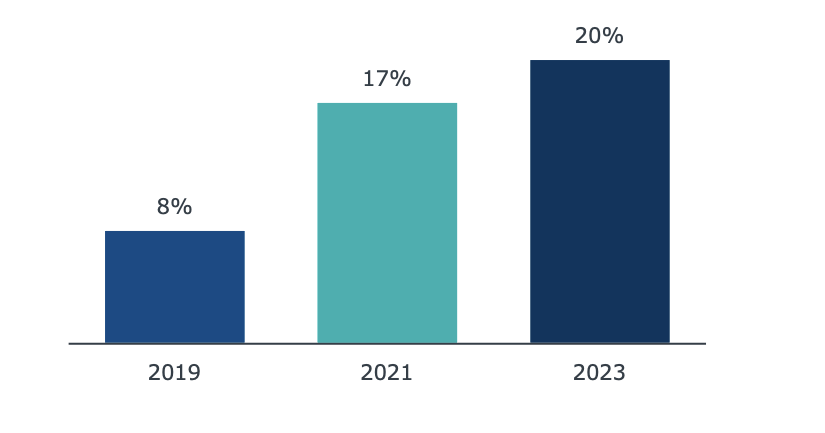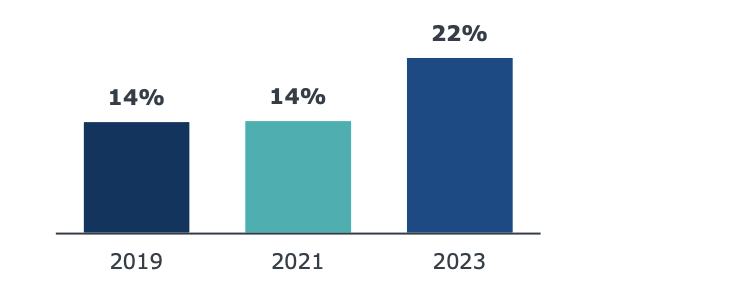
As reported by Scott Jaschik in Inside Higher Ed, a new study suggests that an increasing number of high school students opt out of college due to concerns about its value, academic preparedness, mental health, and affordability. The study, conducted by EAB, an education best practices firm, surveyed over 20,000 high school students and unearthed a concerning trend: 1 in 5 students won’t enroll in college, a significant rise from 8% in 2019.

✅ AI Essay Writer ✅ AI Detector ✅ Plagchecker ✅ Paraphraser
✅ Summarizer ✅ Citation Generator
Key Takeaways
- The number of students expressing doubt about the value of college has increased from 8% in 2019 to 20% in 2023.
- Mental readiness is a growing concern, particularly among first-generation and lower-income students.
- 26% of students chose “whether I’ll be successful in college” as a top concern.
- The pandemic’s impact on mental health and academic preparedness has affected college enrollment decisions.
Concerns Over Mental Health and Preparedness
The increase in mental health issues among high school students due to the pandemic has significantly influenced their decision to attend college. The report states,
This issue has risen particularly among first-generation and lower-income students. Of the students not planning to attend college, those who said, “I’m not mentally ready,” increased sharply to 22% in 2023.
The lack of in-person instruction during the pandemic has compounded these mental health issues by creating gaps in academic achievement and reducing opportunities for social development through classroom interactions. As EAB’s Enroll360 division president, Hope Krutz, states,
“This new data shows us that [the pandemic] is having a profound impact on whether high school graduates decide to attend college at all. One major and worrisome trend that was exacerbated by the pandemic is the prevalence of mental health concerns, including anxiety and depression.””
Moreover, the concern about academic preparedness is also causing students to question their potential success in college. In fact, 26% of students surveyed identified “whether I’ll be successful in college” as a top concern.
Questioning the Value of College
Increasingly, students are questioning the value of a college education. The report found that the percentage of students who say college “isn’t worth it” has risen from 8% in 2019 to 20% in 2023. Additionally, overall enrollment has declined by 2.9% across public four-year schools and 1.8% at private four-year schools since 2017.

This trend is particularly concerning because it contradicts the general perception of college as a pathway to a better future. It suggests that students are becoming more skeptical about whether the cost and effort of obtaining a college degree will yield sufficient returns in their professional lives.
Moreover, 35% of high school counselors noted that fewer students are now considering college than before the pandemic, signaling a shift in perception about the overall value of a college education.
A Call for Adaptation
In light of these concerns, colleges must adapt to meet the needs and expectations of prospective students. As Hope Krutz pointed out, colleges should respond to these concerns by focusing on academic excellence, promoting the mental health services they offer, and presenting them as a regular part of college life.
Additionally, given the growing significance of digital interactions in the college decision-making process, the report underlines the importance of colleges enhancing their digital presence. A well-designed website was identified as a crucial factor influencing the opinions of colleges, with 89% of students and 86% of parents agreeing with the statement.
Furthermore, Krutz highlighted the need for colleges to directly address questions about the return on investment of a college degree. These queries from students are primarily focused on the short-term benefits of a degree, suggesting that colleges should provide clear, accessible information about how their programs prepare students for the job market right after graduation.
Related stories:
New Strategies Unveiled to Boost English Learner Success in High Schools
The Importance of Mental Health in College: From Student’s Perspective
A Student Struggles With Coding Motivation Crisis. Reddit Community Steps in with Lifehacks
Follow us on Reddit for more insights and updates.






Comments (0)
Welcome to A*Help comments!
We’re all about debate and discussion at A*Help.
We value the diverse opinions of users, so you may find points of view that you don’t agree with. And that’s cool. However, there are certain things we’re not OK with: attempts to manipulate our data in any way, for example, or the posting of discriminative, offensive, hateful, or disparaging material.